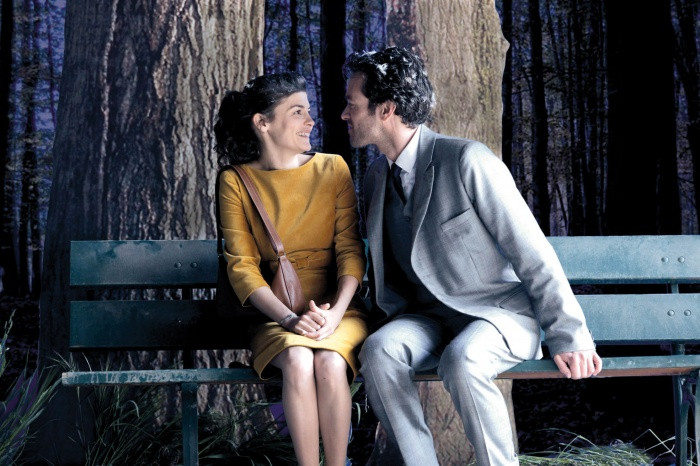Mood Indigo, Michael Gondry’s latest foray into the fantastical, is based on the novel “L’ecume des Jours” by Boris Vian, whose witty introduction appearing at the beginning of the film states: “This is totally true, I made it all up from beginning to end”. There is no fear of any viewers believing that this story is true as from the outset it’s fairly clear that you must leave reality and common sense at the door.
We are drawn in immediately as Duke Ellington’s “Take the A-Train” bellowed over the surreal Gilliam/Kubrick-inspired opening scene. A typing pool of men and women narrate the story, each typist taking their turn to hurriedly type a word as typewriters fly past in a conveyor belt motion. A close up of the text that they type bring us into the fairytale world of Colin (Roman Duris) and his search for love.
Colin lives quite a privileged existence in what seems to be a passenger train suspended on top of a skyscraper with his very own chef and confidant Nickolas (Omar Sy) who spends his days rustling up amazing dishes for his employer (albeit with the help of a TV chef who gives him advice and can stick his hand out of the screen) When we first meet Colin, Nickolas has prepared a banquet fit for a king but it’s no ordinary meal time. Eels which squirm in and out of the water pipes must first be apprehended and cooked. Colourful culinary delights dance around on the plates, disassembling and assembling again and a little mouse (played by a man in a mouse costume) scurries around the kitchen. Colin’s guest is his good friend Chick (Gad Elmaleh), whose arrival is signalled by a doorbell which grows legs and scurries along the wall like a beetle and will not be silenced until it is stood on. It is during this circus-like feast that the premise for the film is set. It seems Chick and Nickolas have met female companions and Colin, whose only passion up to now has been his Piano-Cocktail( probably the most inventive idea in the film-a piano that produces various flavours of cocktails depending on the notes that are played) is outraged and exclaims “ I demand to fall in love too!”.
And very soon he does, with the intoxicating Chloe, played with abundant charm by Audrey Tautou (Amelie, Priceless) who encapsulates his perfect woman effortlessly. She finds his bumbling awkwardness endearing and accepts his proposal as they both get carried off an ice-rink on stretchers. At first, aside from this minor accident, all is rosy in the garden for the two lovebirds. Though to say it is rosy is an understatement and some viewers, if not already worn out by the relentless surreal and hallucinogenic imagery, may have had enough by the time the couple climb into a mechanical cloud and float off into the Paris sky. This whimsical
style of film making, including stop-motion animation, puppetry and various other special effects, won’t be new to anyone familiar with, Gondry’s work (Eternal Sunshine of the Spotless Mind and The Science of Sleep), but in Mood Indigo he really indulges with total abandonment.
In a memorable scene where Colin, Chloe and friends dance to Duke Ellington’s “Chloe” their legs transform, bending in ways that are humanly impossible. Similarly, though it may be a step too far and unnecessary, a child on an ice rink morphs into an Inspector Gadget-like character and strretches up to the roof as a crack in the ice appears and all the other skaters are sucked underneath. Some of Gondry’s flights of fancy really do pay off, in particular a beautifully romantic scene when Colin and Chloe tie the knot and as they leave the church they are suddenly underwater, in their own world, separate from anyone else.
All good things must come to an end but when Chloe falls ill (a water lily that has become lodged in her lung causing a respiratory illness), Gondry’s visual metaphors and wacky imagery are given much more scope . As soon as Chloe falls ill, Colins bright and quirky home shrinks like the rooms in Alice in Wonderland, becoming dark and murky. The bright windows through which we could once spy the Paris skline have been overrun with dusty creeping cobwebs and Nickolas ages about 20 years in the space of a few days. An earlier scene where the couple run hand in hand out of a tunnel as bird feathers fall around them is reversed and now they run backwards away from the light, reminiscent of similar scenes in Eternal Sunshine of the Spotless Mind.
Aside from a slight digression which briefly explores the relationship between Colin’s friend Chick and his lover Alise (Aissa Maiga), Chloe and Colin are the only stars, the other characters merely orbiting them. Although Tautou and Duris’ performances are unwaveringly energetic, and they play characters that are extremely likeable, at the end of the day their personalities are never truly developed and lack complexity. They meet, fall in love, Chloe becomes ill and their common aim is for her to recover so that happiness can be regained. Unlike Eternal Sunshine‘s intricate and heartbreakingly pessimistic take on relationships, Mood Indigo basically squeezes a very simplified message about love and death into a film which is bombarded with a genius imagination.

